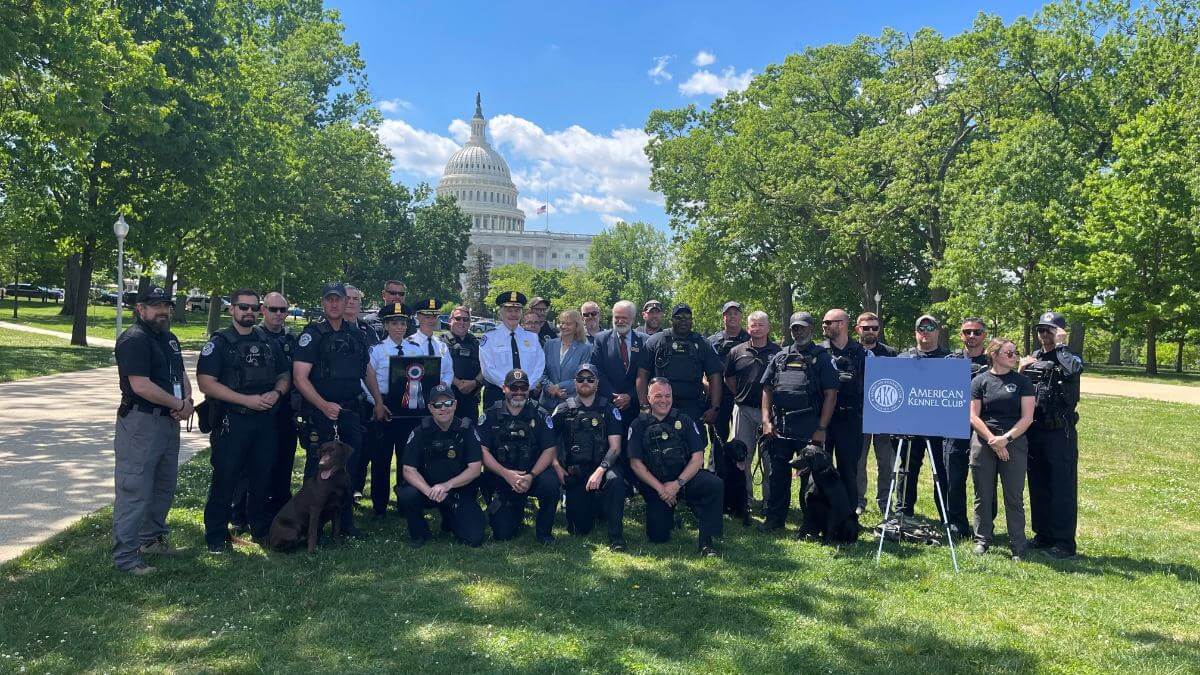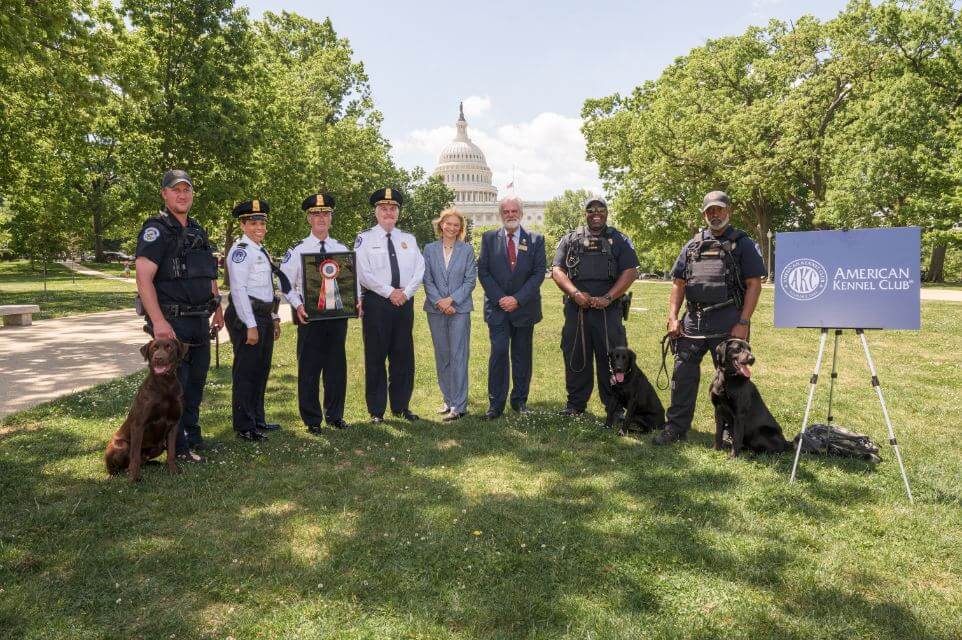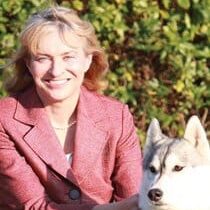


Home » AKC Detection Dog Task Force Demonstrates the Value of Purpose-Bred Dogs

Explosives Detection Dogs play a crucial role in US safety and security at home and abroad, but unlike other vital national security tools, the United States is importing approximately 85-90% of its bomb dogs. This deficit leaves the US captive to other countries for a key national security input, and begs the question, “Why aren’t we relying on US breeders?”
In 2016, the AKC established the Detection Dog Task Force (DDTF) to answer this question and determine what role AKC breeders and trainers could play in addressing and reversing this threat. The Task Force’s study of the issue revealed that a series of complex issues contributes to the detection dog shortage, including:
Little public or policymaker awareness about the crucial role detection dogs play in protecting national security from terrorism; Little understanding about the importance of a reliable domestic source for detection dogs—including the crucial role that high-quality breeders and purebred dogs play in assuring the necessary soundness and breed characteristics required; Government policies and pricing for dogs that lacked transparency and recognition of the real value and cost of producing a high-quality year-old puppy ready for advanced training. For more than a generation, legislation and other government policies actually discouraged the very US breeders we need to protect our security; The need to bring together dedicated breeders, detection experts, trainers, and researchers to share knowledge about how to best raise puppies to be future detection dogs.

After extensive research, the Detection Dog Task Force developed a three-pronged approach to solving the problem. As the task force approaches the Fifth AKC National Detection Dog Conference later this month, the group has seen many recent successes in each of the three focus areas: Working with lawmakers to raise policymaker awareness, change policies, and improve opportunities for US breeders. In addition to in-person advocacy and testimony before Congress on the shortage, the AKC GR team has successfully advocated for permanent funding for the USDA National Detector Dog Training Center, legislation that requires consideration of a minimum number of US-bred dogs in various Department of Defense/TSA government purchase contracts, and legislation to implement health and welfare standards for all government working dogs.
Breeder Education—providing information, tools, and resources to help breeders succeed in breeding, raising, and selling future Detection Dogs. The Confident Puppy e-learning course, available on the AKC Canine College learning platform, leverages content from subject matter experts and the AKC Patriotic Puppy Program to help anyone raise a confident puppy that can go on for advanced training as a working dog, competition dog, or just be a great pet. To date, more than 3,500 people have participated in this course.
The jewel of the detection dog program is the AKC Patriotic Puppy Program (PPP), led by the Task Force’s subject matter expert Stacey West. The AKC Patriotic Puppy Program is a specialized program that works with breeders of Sporting dogs—primarily Labrador Retrievers and German Shorthaired Pointers, as well as several other breeds—who are interested in raising dogs they have bred through a year of age for future careers as Detection Dogs. Breeder participants work one-on-one and in collegial group settings with subject matter experts, trainers, and industry mentors, and receive training to help them establish a path to successfully raising and selling detection dogs even after they’ve completed the program. Today, the PPP has more than 160 participants in 40 states. The PPP expects placement of the 100th program puppy in a detection career this summer.
Raising awareness and bringing together expert stakeholders—including breeders, buyers, researchers, and trainers to create solutions and share best practices. A new quarterly newsletter, The Detection Dog Bulletin, and more than 20 recorded seminars and webinars now complement the task force’s biggest event—the AKC biennial National Detection Dog Conference.
The 2024 AKC National Detection Dog Conference will take place July 23–25 at the Roberts Centre in Wilmington, Ohio. The theme is Detection Dogs: Past, Present & Future, and will include speakers that operate on the cutting edge of canine detection research, training, breeding, and handling.
Seminars and events will look at the crucial role of working dogs in protecting public safety, current trends and context, and explore opportunities for breeders, researchers, industry leaders, and trainers to work together to address the shortage of US-bred detection canines to improve future operations.
Like the 2022 event, this event focuses on presenting practical information and important advances for a range of audiences—breeders, researchers, puppy raisers, trainers, buyers, and handlers of detection canines—and providing real, actionable resources that improve participants’ opportunities to collaborate as the field of canine detection advances and evolves.
To learn more about the conference, visit: www.akcdetectiondogconference.com
The DDTF is poised for ever greater success as a leading voice for purpose-bred working dogs protecting national security, but equally important, this provides the public with a tangible reminder of the extraordinary value that purpose-bred dogs bring to the many different aspects of our lives.

